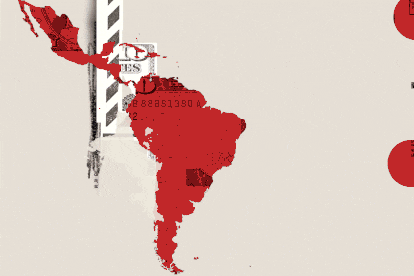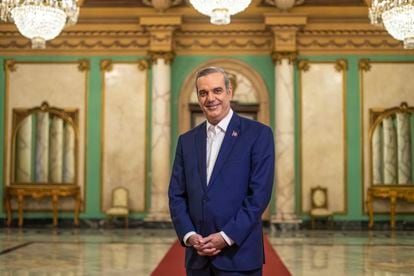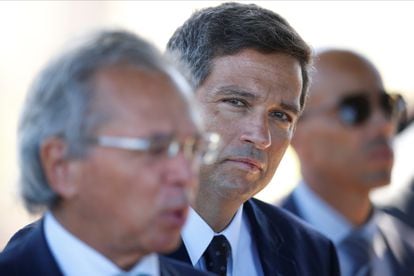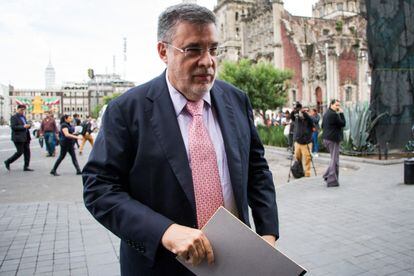Pandora Papers in Latin America: Three active heads of state and 11 former presidents operated in tax havens
Chile’s Sebastián Piñera, Dominican Republic’s Luis Abinader and Ecuador’s Guillermo Lasso feature in the new data leak. Among the region’s former presidents are Colombia’s Gaviria and Pastrana. In Brazil, the investigation has turned up the names of both the economy minister and the governor of the central bank

Three current and 11 retired presidents, 90 politicians in the upper echelons of power, entire religious congregations, world-famous artists, billionaires and even the governor of a central bank; in Latin America, a constellation of influential figures has made use of tax havens over the years.
Despite inhabiting the region dogged by more inequality than anywhere else in the world, members of its elite have used a network of trusts, shell companies and opaque business records in places such as the British Virgin Islands and Panama to keep a substantial portion of their assets from public scrutiny.
It is a complex, obscure corporate web that the publication of the Pandora Papers will put under the spotlight. Obtained by the International Consortium of Investigative Journalists (ICIJ), the data leak is based on 11.9 million files containing the work of 14 offshore service providers. This body of information has been reviewed and analyzed by a team of 600 journalists, with the participation of EL PAÍS and other media giants such as The Washington Post, The Guardian and the BBC as well as numerous local media sites.
While the results of the investigation have a global impact, they are particularly earth-shattering in Latin America, where around $40 billion (€35 billion) is diverted to tax havens each year. As will be published in the coming days by EL PAÍS and the other media participants, of the 35 presidents or former presidents that appear in the documents, 14 are from this region. Most are conservative. Among them are three active heads of state, who have all been wealthy businessmen: Chile’s Sebastián Piñera, Ecuador’s Guillermo Lasso and the Dominican Luis Abinader. Eleven former presidents also appear, such as César Gaviria and Andrés Pastrana from Colombia, Pedro Pablo Kuczynski of Peru, Porfirio Lobo of Honduras, Horacio Cartes of Paraguay, and Juan Carlos Varela, Ricardo Martinelli and Ernesto Pérez Balladares, all of Panama.
Regarding the Chilean president, whose business dealings involved sectors such as airlines, banking and real estate, the investigation carried out by Chilean media outlets CIPER and LaBot has exposed a particularly controversial activity among his offshore operations – namely, the sale of the environmentally sensitive copper and iron mine, Minera Dominga, in the British Virgin Islands together with businessman Carlos Alberto Délano, one of his childhood friends.
In December 2010, when Piñera had been in the presidential residence, La Moneda Palace, for just nine months, the presidential family sold the business to Délano with a deed signed in Chile for $14 million (€12 million) and another in the Virgin Islands for $138 million (€118 million). The amount was to be paid in three installments, with a caveat: the last payment was conditional on there not being environmental protection imposed on the mining operations area, as environmental groups were demanding.
The decision on the viability of Minera Dominga was left in the hands of the Piñera government, which failed to promote environmental protection, so the third installment was finally paid. Despite the lack of transparency, the manager of Piñera’s business affairs stated, when asked, that the president had not managed his own companies for 12 years; that he had been not informed of the process of Minera Dominga’s sale, and that the judicial investigation into the operation had been wound up.
Another president featured in the Pandora Papers is the Dominican Luis Abinader, whose successful business career was in the hotel sector. The documents link him to two companies in Panama, Littlecot Inc. and Padreso SA. Both were created before he took office and were used to manage assets in Dominican Republic. Local media outlet Noticias Sin’s investigation flags up the fact that the shares of these companies were initially “payable to the bearer,” an instrument used to hide the beneficial owner of the companies.

A legislative reform in 2018 obliged the Abinader family to publicly register as beneficial owners. Upon becoming president in 2020, Abinader declared nine offshore companies that he controlled through a trust. Both he and Piñera used the Panama-based law firm, OMC Group, the firm used by Colombian singer Shakira for at least three of the offshore companies the Spanish Treasury has been tracking for years.
The third active head of state who appears in the documents obtained by the ICIJ is Guillermo Lasso, a conservative millionaire and former banker who was voted president of Ecuador last year. According to the documents and the investigation carried out by local media site El Universo, Lasso ended up operating through 14 offshore companies, most of them in Panama, closing them only after former left-wing Ecuadorian president Rafael Correa promoted a law banning candidates from being the beneficial owners of companies located in tax havens.
In his defense, Lasso claims that he opened these opaque companies because national legislation prevents bankers from investing in his country. He also claims that 10 of these companies are already inactive; he denies any relationship with or profit from the other four.
Lasso was a client of Trident Trust, one of the largest providers of offshore entities in the world. This Swiss company is known for its discretion regarding these types of solutions and appears again and again in the operations uncovered by the data leak, together with the law firm Alemán, Cordero, Galindo & Lee (Alcogal), which has a host of clients in Latin America. Alcogal created the majority of the 78 companies used by the Venezuelans accused of hiding $2 billion (€1.75 million) from the state-owned oil company, Petróleos de Venezuela (PDVSA), in accounts in Andorra. A significant number of the Chavista hierarchy are among the beneficiaries of this scheme, according to Armando.info’s investigation.
In Brazil, the Pandora Papers shed light on the activities of the two most powerful men in the country’s economic sector: the economy minister, Paulo Guedes, and the president of the central bank, Roberto Campos Neto. Neither disclosed their offshore activities to the public before assuming positions involving decisions on these types of investments. This possible conflict of interest is particularly pertinent in the case of the economy minister who has pushed through a tax reform to reduce the pressure on private money in tax havens.
Guedes, 72, is listed as a shareholder in Dreadnoughts International Group, a company registered in the British Virgin Islands. It is what is known in financial jargon as a shelf company: firms that are opened in tax havens but can remain inactive for years, waiting for someone to give them a purpose. The documents show that Guedes, who is the economic guru of Brazil’s President Jair Bolsonaro, and one of the country’s most controversial figures due to his connections with the financial elite, had at least $8 million (€6.89 million) invested in the company in 2014, registered in his name, that of his wife, Maria Cristina Bolivar Drumond Guedes, and that of his daughter, Paula Drumond Guedes. In response to the investigation, Guedes sent a statement to Piauí magazine pointing out that these activities “were duly declared to the tax authorities and other competent bodies, including his participation in the company Dreadnoughts International Group.” The statement also says: “His actions always respected the relevant legislation and were guided by both ethics and responsibility.”
Meanwhile, the central bank president, Campos Neto, owns two companies, Cor Assets and ROCN Limited, both registered in Panama in partnership with his wife, lawyer Adriana Buccolo de Oliveira Campos. The stated purpose of the companies was to invest in financial assets from Santander Private Bank, as a member of its executive board. The other opaque companies are Peacock Asset, managed by Goldman Sachs, and which was discovered in the Bahama Leaks investigation in 2016; and Darling Group, a “real-estate management” company.

Like Guedes, the central bank president claims that he declared all his money abroad to the Presidency of the Republic’s Ethics Commission, as well as to the Brazilian tax authorities and to the central bank itself. He also insists that he has built his “assets with the income acquired from 22 years working in the financial sector.”
Colombia is another Latin American country where a lack of transparency in the financial dealings of the political elite has been particularly extensive. Among the public figures who appear in the leak are two former presidents: the liberal César Gaviria Trujillo, who was in office from 1990 to 1994, and the conservative Andrés Pastrana Arango, who governed between 1998 and 2002. Both men, who retain significant political influence, resorted to these obscure corporate vehicles once they had left power.
In Argentina, the Pandora Papers shed light on the activities of Jaime Durán Barba, a political consultant who catapulted Mauricio Macri to the presidency in 2015; and Zulema Menem, daughter of former president Carlos Menem (1989-1999). Also flagged up for murky offshore dealings is the late Daniel Muñoz, secretary of former president Néstor Kirchner, as well as several key figures that feature in the lawsuit filed for the receipt of alleged illegal commissions paid by public works contractors to Peronist governments.
The results of the investigation in Mexico are significantly more far-reaching, with the documents implicating more than 3,000 people, including three of the richest business tycoons in the country: the mining magnate Germán Larrea, the heiress of the Modelo beer group, María Asunción Aramburuzabala, and Olegario Vázquez Aldir, whose group controls private hospitals, hotel chains, insurance companies and the media. Their combined fortunes amount to more than $30 billion (€25.8 billion).

All three used tax havens to create corporate vehicles through which to operate internationally. Larrea went so far as to open nine companies in the British Virgin Islands between 2013 and 2016 through which he managed the acquisition of luxury real estate in the US, leaving scarcely a trace. Aramburuzabala bought million-dollar properties in Utah and New York as well as two private planes. And Vázquez Aldir and his entourage acquired yachts, a plane and at least two mansions through eight shell companies. Neither Larrea nor Aramburuzabala have responded to questions from journalists working on the investigation while, speaking through a lawyer, Vázquez maintains that he complies with all tax and legal obligations both in Mexico and abroad.
A political figure in Mexico whose activities have featured big in the investigation is Julio Scherer Ibarra, who was legal advisor to Mexican President Andrés Manuel López Obrador up until a month ago. In 2017, he was listed as the sole owner of a firm based in the British Virgin Islands with assets valued at $2 million (€1.72 million) from his work as a private lawyer. The firm owned a company in the US that had a luxury apartment in an exclusive area of Miami. The business in the Virgin Islands became inactive in 2019, 11 months after Scherer joined the Mexican government, but the company in the US still owns the Miami apartment. Asked about these activities, the former presidential advisor has pointed out that on the dates he made the investments he was not a public official but an independent professional.
The Pandora Papers also show how there was a proliferation of people close to certain centers of Mexican power making intensive use of offshore financial services. This was the case in circles close to former president Enrique Peña Nieto (2012-2018) and also with large suppliers linked to the Mexican public oil company Pemex, an energy giant that is currently in debt to the tune of almost $114 billion (€98.14 billion).
EL PAÍS reporters Georgina Zerega, Elías Camhaji, Zorayda Gallegos, Eliezer Budasoff, Federico Rivas, Carla Jiménez and Inés Santaeulalia contributed to the reporting for this article.
The Pandora Papers investigations in Latin America counted on reporting from journalists at the following media outlets: La Nación, elDiarioAR, Infobae, El Deber, Agência Pública, Metrópoles, Poder360, Revista Piauí, Ciper, LaBot, CLIP, El Espectador/CONNECTAS, Costa Rica Noticias, Proyecto Inventario, Noticias Sin, El Universo, El Faro, Plaza Pública, Contracorriente, Proceso, Quinto Elemento Lab, Univision, Confidencial, Grupo ABC Color, Convoca, IDL-Reporteros, Centro de Periodismo Investigativo and Armando.info.
English version by Heather Galloway.
/cloudfront-eu-central-1.images.arcpublishing.com/prisa/OGU6G34KXRATBFKGFVZLGSTZQI.jpg)
/cloudfront-eu-central-1.images.arcpublishing.com/prisa/ICAUPTYNKFEAPIAJ24XJC2DOXA.jpg)










































